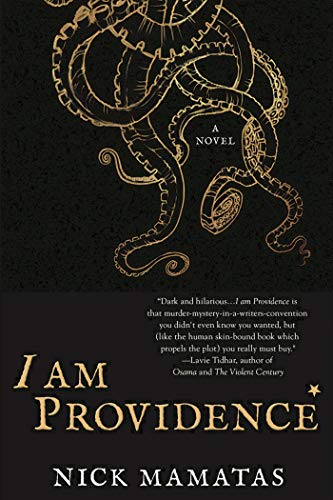
![]() I Am Providence by Nick Mamatas
I Am Providence by Nick Mamatas
“On any other weekend, my body would have been discovered more quickly.”
Panos Panossian is not the kind of a guy to let the mere fact that he is dead stop him from narrating; even if his first-person narration starts after he’s been killed, and is a faceless corpse in a cabinet in the morgue. That quote is the opening sentence in I Am Providence, a multi-genrebending novel by Nick Mamatas.
Panossian is, well, was a novelist, and a novelist in a very specific niche with a very specific fandom; he wrote Lovecraftian fiction. He was attending the annual Summer Tentacular, a Lovecraft convention held in Providence, Rhode Island. Panossian has a good memory of what happened until shortly before he was killed, but no memory of the act itself, although he’s really clear that he’s dead, and that his face was removed.
The other half of a narrative is told through the point of view of Colleen Danzig, a green-haired, vegan horror writer who has had some success in the Lovecraft subgenre. This is her first Tentacular, and to save money she agreed online to share a room with Panossian. Through Colleen’s newcomer eyes we see the regulars of this celebration of Providence’s weirdest, creepiest and most famous writer.
Mostly, this book is a murder mystery, and as a mystery it holds up well. Mamatas plays fair with his readers; there are actual clues that are well-planted and genuine red herrings. I Am Providence is also a grim and at times savage comedy, and that works well too. The horror element is delivered flawlessly by Panossian’s increasingly non-linear musings, as he realizes that his consciousness is changing, that he is no longer just a few randomly firing synapses, that he is moving to another place, one he cannot describe.
Mamatas knows his way around Lovecraft, and he doesn’t pull punches here. I think this is a roman a clef, with the high-profile characters (“characters” in all senses of that word) who make up the core of the Tentacular standing in for, or perhaps amalgams of, actual writers. They are lampooned, but they aren’t flat characters or stick figures. Panossian muses on the attraction of Lovecraft in spite of his misogyny and racism. He, and by extension Mamatas himself, refuses to let Lovecraft off the hook by claiming he was just racist “of his time.” Several of the more passionate fans support Lovecraft’s view on race and gender. Before he is murdered, Panossian tells Colleen that she is a good writer and she should find something else to write, as if he believes Lovecraft fiction is a trap or a dead end, yet it is where he has spent his life. Perhaps that’s his point.
Panossian — and Mamatas — not only know a lot about Lovecraft. Both author and character understand about the internet, about insolation and loneliness and how they can make us behave. They both understand about obsession, and they both understand fandom. Yes, there were times when I wasn’t sure who was speaking, Panossian or the author, but what was being said in I Am Providence was still so interesting that I really didn’t care.
Mamatas has also given some thought to the trope of the amateur sleuth, and plays against convention here. The Providence police were some of my favorite characters. This is not a the-cops-are-dumb story; they are professionals who are all too familiar with the antics of Lovecraft-fans, and who are truly law enforcement, with all those strengths and all those blind spots. Mamatas uses them with great skill to make a lot of telling points. One of my favorite is how the African-American cop reacts when he arrives with others to investigate a group from the convention, including Colleen, who have marched out into the night to find the grave of Lovecraft’s cat and exhume the cat. The cop’s reaction, when he is told the name of the cat, which is a racist slur, is elegant and economical.
More importantly, the police seriously question Colleen’s need to investigate, and so do the Lovecraftians. It’s not that they might be hiding something — well, of course they are — it’s that she is a newcomer, an outsider, and her desire to solve the crime seems suspicious. Throughout the book we see Panossian’s recollections of his feuds with the other fans, but near the end, when Colleen confronts them and says they hated him, they reply with sincerity that they loved him because he was part of the community.
Along the way are bits of Arkhamesque creepiness, like books bound in human skin, and really clever Lovecraftian puzzles, like a room-party where the theme each year is one of Lovecraft’s stories, and the partygoers have to guess which one it is. There is some generalized fun-poking at con-goers of all stripes: the guy who has to hit on everyone female, the feminist fan and the men’s-rights fan who argue at every meeting, and the unruly panel. When you least expect it, Mamatas stabs you through the heart with an insight: the way a certain voice makes Panossian feel; the sound his father makes upon seeing his body.
I honestly don’t know if a person who doesn’t know something about Lovecraft or about various fandoms will “get” I Am Providence, but for those of us who do this is a fast-paced, entertaining read with moments of startling depth. It’s funny, it’s creepy, it’s sad and it’s very Lovecraftian.



Satirical Lovecraftian murder mystery? Sign me up!!
This sounds terrific! Right up my alley. :-)